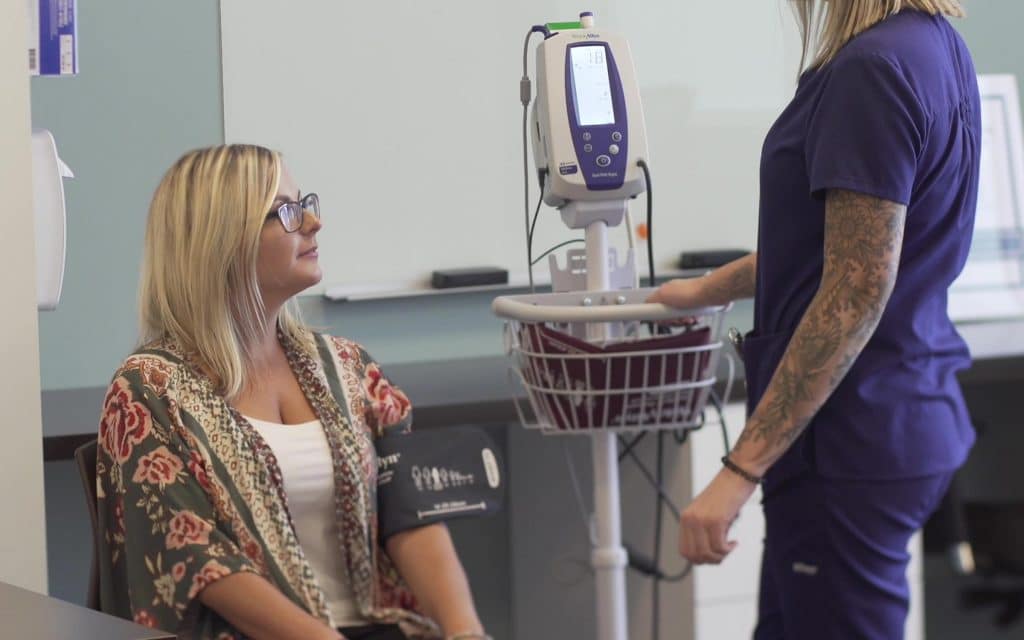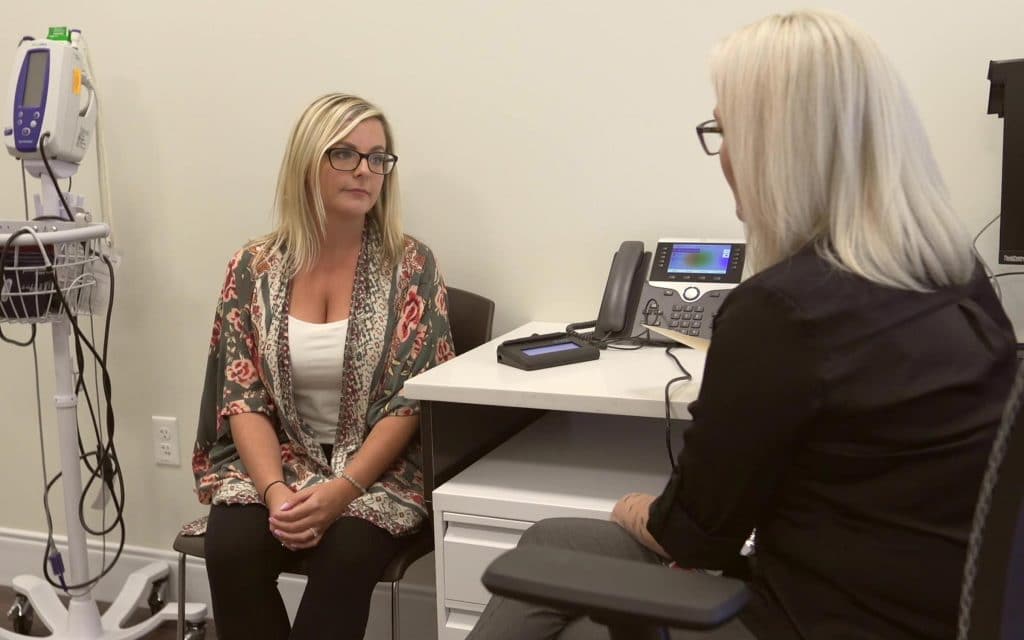Customized clinical approach
Recovery Centers of America believes that the most effective addiction and mental health treatment comes from a custom-tailored clinical approach to each patient.
Ensuring every moment of treatment is safe and comfortable
Starting from your very first contact with us, our team will begin gathering and analyzing key information about you and your situation to determine how we can best help you as a unique individual.
Mission Center prescreen

Medical evaluations

Clinical assessments

Need addiction treatment? We’re here for you 24/7.
Contact Center prescreen
Our call center team, known as “The Mission Center,” will complete an initial prescreen assessment to determine which facility is the best fit for your patient profile. They will ask about your mental and physical condition, which substances and mental health issues you are struggling with, as well as about your financial situation and coverage options. Once the phone assessment is complete you will be scheduled for admission at the facility best equipped to effectively treat someone with your unique patient profile.
The information gathered and evaluated during a prescreen assessment varies but may include:
- Demographic information
- Financial status & insurance information
- Brief substance abuse history, frequency, duration and consequences
- Main reason for seeking treatment
- Risk for Harm to Self/Others Assessment
- Any pertinent medical information
Medical Evaluations
Patients admitted to residential addiction treatment at RCA receive one or more medical evaluations completed by licensed medical practitioners for the purposes of examining physical health, identifying any medical problems and determining the need for medications. Certain medical evaluations such as the vital sign assessment (blood pressure, heart rate, respiration rate, temperature, SAO2 and neurocheck if ordered) and others if deemed necessary by our expert medical staff, who may continue at regular intervals throughout the patients stay. RCA is committed to providing safe and effective monitoring of health status while promoting wellness and holistic care for all of our patients.
Medical evaluations may consist of:
- Medical history and reason for treatment
- Review of biological systems (HEENT, neck heart/lungs, abdomen, extremities, and neurological)
- Vital signs (blood pressure, heart rate, respiration rate, temperature, SAO2 and Neurocheck if ordered)
- Blood panel (GGT, CMP, CBC with diff, Hepatitis panel, HCG for females under 55)
- STD and communicable disease testing
- Immunization
- Urinalysis (substance identification, pregnancy, etc.)
- Breathalyzer testing
- Symptoms of addiction and withdrawal
- Allergies and current medications
- Medical diagnosis and treatment recommendations
- Prescription of medications for detox and residential treatment
During the detox period patients need the most attention and care. To properly accommodate this period of particular vulnerability, the RCA nursing staff monitors and assesses vital signs and physical wellbeing of detox patients more rigorously. Clinical Opiate Withdrawal Scale (COWS) or Clinical Institute Withdrawal Assessment (CIWA) may be used by the nursing staff to help monitor and evaluate patient state. During residential treatment, vital signs and physical wellbeing are typically also monitored but less often.
Clinical Assessments
The purpose of clinical assessments is to ensure we establish and maintain an accurate and comprehensive evaluation of our patients and to have a clear understanding of their needs, strengths, abilities, areas they would like to focus on, issues that are important to them and to consistently provide the most appropriate level of care. To do this, we utilize trusted drug and alcohol assessment and evaluation tools recommended by the American Society of Addiction Medicine. One of the most important clinical assessments performed is the “Biopsychosocial”, it is the foundation for developing each patient’s individualized treatment plan.
The Biopsychosocial assessment is very comprehensive and typically consists of:
- Substance abuse history focusing on how it has affected the patient financially, physically, and emotionally
- Medical status, including self-care needs
- Co-occurring disorders
- Emotional/behavioral treatment history
- Employment and education history, including patient’s preferred learning style
- A brief legal history with discussion as to the nature of the urgency of the legal difficulty and the extent to which the patient’s legal problems might influence her/his progress and course of treatment
- Family history and current family circumstances, including status of and comfort with significant interpersonal relationships, events in the patient’s development history; identification of family and/or natural supports; a history of psychological or addiction problems within the family; a statement of the patient’s understanding of the family’s exceptions regarding the nature and length of the treatment programs, and the nature of family involvement
- History of trauma
- Spiritual needs
- Recreational activities, and how they may play into the recovery process
Clinical assessment or problems including patient’s motivation for treatment and understanding of the problem and goals of recovery, recommendations, interventions and approaches to the problem(s) while in treatment.
Psychiatric Evaluation
Psychiatric evaluations are provided on the basis of need and applicability. If determined necessary, a psychiatrist or psychiatric nurse practitioner will see the patient and attend to their psychiatric needs. A psychiatric evaluation may include a review of presenting problems, reason for seeking treatment, symptomatology, mental health history, treatment history, mental status exam, safety screener and more. The psychiatric professional assigned to the evaluation will also examine the admission diagnosis and provide relevant treatment plan recommendations based on their psychiatric expertise.
Additional Assessments
In addition to the above outlined assessments, other on-site assessments may be conducted on the basis of need and applicability. These assessments may include the following:
- Psychiatric (including ongoing assessment of depression, anxiety, etc.)
- Nutritional (regular, vegetarian, diabetic, gluten free, low sodium, other)
- Gambling issues
- Safety screening
- Treatment planning
We plan your care based on your assessment and drug and alcohol evaluation results. By conducting these extensive assessments, we create an individualized, comprehensive treatment plan that covers you from the day you arrive at RCA, throughout your inpatient stay, and even after discharge, to maintain ongoing recovery support.
Your treatment plan may include:
- Medical detoxification
- Medication Assisted Treatment such as Methadone, Suboxone or VIVITROL®
- inpatient drug or alcohol treatment
- Psychiatric Screenings & Interventions
- Cognitive behavioral therapies
- Family therapy
- Neurofeedback therapy
- Fitness and Nutrition planning
- Mindfulness therapy (Yoga and Meditation)
- Alternative therapies (Art, Music, Equine, Photography, etc.)
- 12 Step meetings and education
- outpatient drug and alcohol treatment
- Recovery support services
- Self-help groups
Each patient presents a unique mix of variables to analyze, a particular social background, a set of individual concerns, varying levels of addiction to varying substances, potential psychological and physical health challenges, and many, many others. Evaluation of all these variables and the formulation of an effective, individualized treatment plan is the tried and tested cornerstone of many success stories. When armed with the correct information, RCA’s group of highly experienced addiction professionals have shown time and again that they can use their expertise to guide patients towards a long and lasting recovery.

